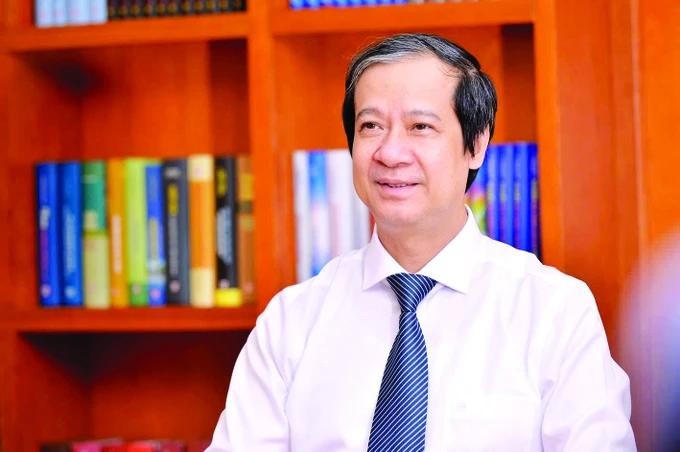
In just two days, teachers, students and pupils across the country will officially commence the new school year 2024-2025.
This year, the education sector will prioritise the implementation of several significant tasks. On the eve of the new school year, Minister of Education and Training Nguyen Kim Son presented the press with an overview of the key issues currently facing the education sector.
In merely two days, educators, students, and learners nationwide will officially begin the 2024-2025 academic year. This year, the education sector will focus on executing several important initiatives. On the brink of the new school year, Minister of Education and Training Nguyen Kim Son provided the media with an overview of the critical challenges currently confronting the education sector.
In the 2024-2025 school year, along with the whole country, the education sector will continue to focus on implementing the major tasks assigned by the Party, the National Assembly, and the Government, including the task of continuing to innovate education and training.
This year's theme, chosen by the sector, is innovation, quality enhancement, unity, and discipline, and it comes with a list of 12 crucial goals and initiatives.
Since previous school years, the Ministry of Education and Training has been proactive in its preparations, realizing the importance of this academic year. The framework for the 2025 high school graduation exam, for example, was developed after considerable public input and has received strong support. The Ministry started getting ready for the next high school graduation exam once this plan was announced.
The regulations pertaining to the 2025 high school graduation examination are scheduled to be published in November 2024. The primary objective is to establish a durable and consistent framework for the exam, which will benefit students, teachers, schools, and local authorities in its implementation.
To ensure a thorough evaluation, the preparation for the 2025 high school graduation exam will undergo extensive piloting, with the Departments of Education and Training devising plans for this initiative while also conducting practice sessions to mitigate potential risks during the official examination.
The nation presently employs around 1.6 million teachers. Throughout the 2023-2024 academic year, the education sector enlisted a total of 19,474 teachers. However, the student population continues to grow, resulting in a corresponding rise in the number of courses.
In the 2023-2024 school year, the number of junior high schools increased by 7,198 classes (equivalent to an increase of 13,676 teachers), the number of high schools increased by 1,213 classes, an increase of 2,729 teachers compared to the 2022-2023 school year, leading to a large number of teachers still lacking in most localities.
The Ministry of Education and Training has collaborated with the Ministry of Home Affairs to recommend that competent authorities distribute the remaining staff quotas in accordance with the Central Government’s Decision 72.
At the same time, the Ministry urged local administrations to have appropriate support policies for local teaching staff based on specific socio-economic conditions to assure teachers during their work.
The Ministry of Education and Training will also continue to improve policies and laws to enhance the status of teachers. The Law on Teachers will be submitted to the National Assembly to create a legal corridor for the promulgation of policies on remuneration, recruitment, use, management, honor, reward and empower the education sector to proactively recruit, mobilize, and arrange teachers.
Indeed, there remains a significant proportion of classrooms that have not yet been consolidated, with an average of around 15.5 percent of classes across the country lacking this status. There is still a shortage of classrooms in areas with high population density, mountainous areas, remote areas, and areas with special difficulties; the rate of meeting the prescribed standards for teaching equipment nationwide is still low, only reaching 50.63 percent.
Therefore, to realize the goal of educational facilities to be solidified and address the current difficulties in facilities and schools, great efforts are needed from localities, including the advisory role of the Departments of Education and Training.
The 2024-2025 school year will be the year of preparation for the 5-year plan, Minister Son said that local Departments of Education and Training need to take heed to advising on the development of the 2025-2030 5-year plan to proactively invest in education. Furthermore, it is imperative that localities guarantee a minimum budget allocation of 20 percent for education.
One of the key goals of the education sector for the 2024-2025 school year is to utilize the state budget and mobilize investment resources for education effectively.
























